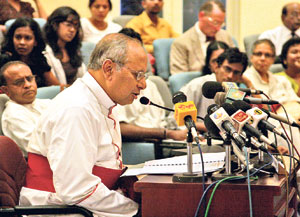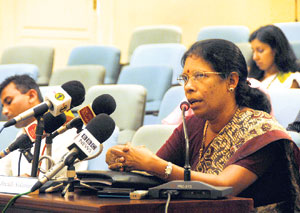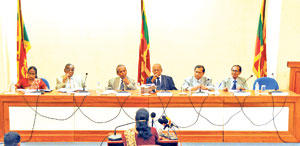The Lessons Learnt and Reconciliation Commission (LLRC) heard submissions from Cardinal Malcolm Ranjith, who is also the Archbishop of Colombo, on the Catholic Church’s views on how best to move forward in the aftermath of the war, while former Government Agent (GA), Mullaitivu District, Ms Imelda Sukumar, who served there till almost the end of the fighting, gave an insight into the obstacles faced by government officials who worked in the area during those difficult days.
Cardinal Malcolm Ranjith during his submissions on Wednesday said that, though errors have been made in the past by all stakeholders, what is now important is to learn lessons from those errors and move towards genuine reconciliation.
“The search for a political solution must be intensified. It is only a political solution that will help eliminate the root causes of violent insurrection, ethnic disharmony, suspicion and mistrust between the communities,” he said.
 |
| Cardinal Malcolm Ranjith making his submissions to the Commission |
The Cardinal noted that the roots of the conflict in Sri Lanka can be traced back to the 1950s, especially the Sinhala Only policy of 1956, which disregarded the multicultural and pluralistic nature of Sri Lanka’s society, and paved the way for Sinhala dominance, and the trend towards mono-culturalism.
“The Official Languages Act, the introduction of the first Republican Constitution of 1972, as well as the Constitution of 1978, where the Sinhala language and Buddhism were given an exalted place in the Constitution, was a landmark in the slide towards a divisive tendency within the country”. He added that the Republican Constitution of 1972 and the 1978 Constitution also omitted or overlooked the provisions of the Soulbury Constitution, which had enshrined safeguards for the minorities, and said such irritants must be avoided in the future
The Cardinal also refered to the colonisation schemes that took place under successive governments, which, even if well meant, served rather as irritants than as catalysts for unity. He added that it was necessary to allay fears of new settlements in the north and east after the war ended, which is seen as a new wave of colonization by the people of these areas. “There is a fear of mass scale colonisation of the north and east, which could lead to a feeling among the Tamils, of a “cultural invasion” of their traditional areas of residence,” he said.
The promotion of trilingual education in schools, as well as the implementation of the Language policy was also stressed by him. “Sri Lanka should be a democracy within which all ethnic and religious groups, irrespective of their numbers, identify themselves as citizens of one country. Race and religion based political structures are best avoided, in the search for national integration, “he said.
The Cardinal also said that the Catholic Church was in no way advocating support for the LTTE, and stands firmly for a united Sri Lanka.
Bishop Kingsley Swamipillai of the Diocese of Trincomalee-Batticaloa, in his submissions to the LLRC, said that there are a large number of persons reported missing or have disappeared, whose fate is unknown for many years. These, he said, include Rev Fr Nihal Jim Brown who disappeared in Allaipiddy in Jaffna in 2006 and Rev. Fr. Joseph Frances who was last seen in Vettivikkal, Mullaitivu in May, 2009.
Bishop Swamipillai also spoke on the need to release without delay, detainees not directly involved with terrorist activities, and provide facilities to family members of detainees, to visit their loved ones in detention.
 |
| Government Agent Jaffna, Ms Imelda Sukumar making her submissions to the Commission |
Rev Fr George Sigamani, National Director- Caritas Sri Lanka, the social arm of the Catholic Church, in his submissions, said they support the full implementation of the 13th Amendment to the Constitution. “The 13th Amendment was adopted by Parliament with an overwhelming majority, and is very much a part of the Constitution. The defeat of the LTTE has provided the President with an opportunity to settle the problems of the people of the north and east, by its full implementation,” Rev Fr Sigamani said.
President- Catholic Lawyers Guild, Shamil Perera, who also made submissions, said that the Catholic Church supported the lifting of Emergency Regulations, as well as the repeal of the Prevention of Terrorism Act (PTA).
Chairman- LLRC, former Attorney General C.R. De Silva said that the Commission, in its interim report, had already made several recommendations to President Mahinda Rajapksa, including the issue of detainees and the implementation of the Language policy.
He, however, said that, while certain sections of the Emergency have already been relaxed, it is too premature to repeal the PTA, maybe except some of its obnoxious clauses. “I agree that there must be more judicial supervision in detentions,” Mr. Silva said, adding that, there were still remnants of terrorists within the country.
Meanwhile, GA Jaffna, Ms Imelda Sukumar, who served as GA Mullaitivu from 2002 to January 2009, in her submissions on Thursday said, she and her officials had served in the area during some of its most difficult times, when they had to deal with victims of the tsunami and later, those affected by heavy fighting in the area.
Ms Sukumar said that, as the war intensified towards the end of 2008, people from the districts of Vavuniya, Mannar and the entire population of Kilinochchi also moved into Mullaitivu, along with the LTTE cadres, increasing the population there to around 350,000. “While in Mullaitivu, I always maintained three months buffer stock of food,” she said.
Ms Sukumar said that, around January 19, 2009, she was informed by Vavuniya Security Forces Commander, Maj. Gen Jagath Jayasuriya (Presently Commander of the Army) via fax, to declare a ‘Safe Zone’ and inform the people to make their way towards that area. “We were in Puthukudiyiruppu at the time I received the fax. Then, along with a map indicating which areas to move to, I made the necessary arrangements to declare a ‘Safe Zone’,” she said.
Ms Sukumar was also informed that, on January 22, those who wanted to make their way into the government controlled area, could do so between 10.00 am. and 2.00 pm, when it would be a “No-War” interval.
“I informed my officials and the United Nations (UN) staff there as well that it was safe to move out during that time. I also decided to leave, even though my staff did not want me to go. I had to leave, as I was unwell and needed medication. However, my staff members who wanted to leave were prevented from doing so by the LTTE,” she said.
 |
| The Lessons Learnt and Reconciliation Commission in session |
The Jaffna GA said that, once she moved to Vavuniya, she continued to operate from there, by coordinating with the Essential Services Commissioner S.K. Divaratna and the World Food Programme (WFP), to send food supplies via ship from Trincomalee to Mullaitivu. She said that a minimum of three food ships were sent each week, and she received confirmation via fax and telephone, from the Additional GA in Mullaitivu, that the food had been received.
She said that, only the International Committee of the Red Cross (ICRC) and government officials who distributed the food among the people, were present in the area. She said that, she had heard that the LTTE was pilfering some of the foodstuff, but she believed that about 80% of the stocks reached the people it was meant for.
Ms Sukumar said that, people continued to flee the area using white flags, and moved to Vavuniya between January and May. Hence it is possible that the number of people in Mullaitivu had reduced from its peak of 350,000.
LLRC Chairman C.R. De Silva: When you left on January 22, 2009, was the
Puthukudiyiruppu Hospital damaged?
Ms Sukumar: No, it was not damaged. I was occupying the Additional GA’s bungalow opposite the hospital.
The last day I was there, I asked the people to leave for the ‘Safe Zone’ that had been declared. I told them it is not safe to stay here. I had the fax with the map indicating which areas are safe for the people to move to.
Chairman: By January 22, had the
people started to move out of the
Puthukudiirippua area?
Ms Sukumar: Yes, they had moved to the ‘Safe Zone’.
Chairman: What was the population in the area at the time?
Ms Sukumar: There were around 350,000 people, as they were from four districts namely, the entire Kilinochchi district as well as some areas of Mannar and Vavuniya, as well as the Mullaitivu population. But, from time to time, they used their influence with the LTTE to leave or escaped into government controlled areas. So the number must have reduced.
Chairman: Do you think the LTTE used the people as a human shield?
Ms Sukumar: They did not allow the people to leave the area, and restricted their freedom to move about. There were two of my officials who had been selected to the Foreign Service and asked to come for an interview, but the LTTE refused to issue a pass for them to leave. I intervened on their behalf and spoke with the LTTE, but they did not let them leave.
The two officials missed the exam and did not gain entry into the Foreign Service. Even after the war ended, they appealed to the Foreign Ministry to given them another opportunity, which was not done. Even during the time of the CeaseFire Agreement (CFA), the LTTE issued passes for people to leave the area. I had pass number 2. I don’t know who number 1 was.
Chairman: How did they use the people as human shields?
Ms Sukumar: The LTTE knew if they did not keep the people with them, they would be easily identifiable. So they restricted their movements. If not for the civilians, the security forces would have moved into the area sooner. When the ‘Safe Zone’ was declared, LTTE members too moved there. Even on January 22, when I left, there were many people crying and asking the LTTE to let them go.
Chairman: You said people carried white flags when they moved into government controlled areas. To your knowledge, were such people ever shot at?
Ms Sukumar: No one was shot at. Even my driver used a white flag to flee the LTTE, who were demanding one of his two children to join the group. He said, he entered the area under security forces control, carrying a white flag. There were many such people who came and met me in Vavuniya. Not a single instance was reported to me of anyone coming with white flags being shot at, though there were instances where the LTTE fired at people trying to escape.
When asked how many people may have been killed in the fighting, in the area, Ms Sukumar said that the GAs of the respective districts were in the process of collecting data along with their resettlement work, to ascertain the correct causality figures.
Former University Grants Commission (UGC) Chairman Dr. Arjuna Aluvihare in his submissions to the Commission, said that, he is appalled that international rights organizations such as Human Rights Watch (HRW), have turned down the invitation to come before the Commission and give evidence.
“They should have had the guts and the courage to come before the Commission. Their questioning of the independence of the LLRC is unwarranted,” Dr. Aluvihare said.
He also said that, he is appalled at the decision of the United National Party (UNP) to boycott the debate on the 18th Amendment to the Constitution, stating, they should have participated in the debate, at least to go on record with their views.
He further noted that, while it is laudable that the Commission is visiting the north and east and meeting with people there, they should also meet with people in other areas of the country, to hear their views on how to bring about reconciliation. |




